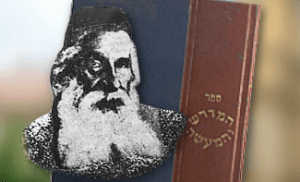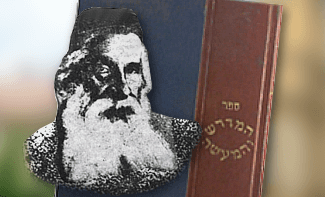
Every man whose heart inspired him came; and everyone whose spirit moved him brought the portion of Hashem for the work of the Ohel Moed.[2]
The gemara records a fascinating exchange. King Munbaz was accosted by family members angry at this depleting his royal fortune by sustaining the poor during a famine. “Your forbears amassed wealth and added it on to what their ancestors had acquired. You’ve done the opposite. Rather than contribute more, you’ve depleted what others saved!”
Munbaz responded, “My fathers hoarded below, while I have hoarded above, in Heaven. My fathers hoarded in an insecure place; but I have hoarded mine in a secure place. My fathers hoarded something that does not produce fruit, while I have hoarded something that does produce fruit.”[3]
Munbaz speaks of three different types of giving, and his reason for supporting each variety.
The first is the way of our forefathers – giving freely to those who ask, without deep strategizing and weighing of options. When they saw the poor in need of food or clothing, they responded with a generous hand.
In time, a new generation arose, that began discriminating between different kinds of need. In modern times, many frown upon giving charitably to the needs of the hour. What is gained, they argue, by simply depleting available funds, with much of the outlay lining the pockets of the collectors for no good reason? Instead, they developed a new type of giving, preferring to build institutions that last for the foreseeable future. They invest in institutional building, creating shelters for the wretched and soup kitchens that are long-lasting contributions, rather than ephemeral ones.
Others find even that unsatisfactory. Such institutions require continuous funding to stay afloat. Better, they argue, to get to the root causes of poverty, and to provide the needy with the ability to stand independently. They establish schools, vocational training programs and agricultural collectives – all to offer people a way to become self-sustaining. (Ironically, the rigor and precision with which they allocate their tzedakah does not carry over to their personal lives. They freely lavish money on their personal enjoyment, on comfort and diversions that serve no greater purpose.)
Munbaz was committed to all three of these charitable approaches. His three statements lift up each of them for praise. In reverse order, he spoke of donating to causes that “produce fruit,” meaning programs that lifted the poor out of their poverty, giving them the self-respect of independence from the public dole. He created institutions that lived on in time, effectively shifting wealth to a “secure place,” rather than squandering it on the enjoyment of the moment. He did not, however, shy away from offering help to those in immediate need of critical subvention. His critics saw this as a financial sink-hole that consumed vast sums of money without leaving any trace behind. He responded that while nothing visible remained of this kind of donation, its mark was entirely evident and preserved in Heaven.
Why is it that we can point to very different legitimate ways of giving, rather than a single prescribed route? For all that we can reason about the justice in giving tzedakah, the source of the mitzvah is not in the mind but in the heart. And the heart cries out in response to need, “Give! Give this way, and give that way as well!”
Chazal expressed just this point.[4] “They asked Shlomo, son of Dovid: How far does the power of tzedakah extend? Shlomo said to them: Go out and see what my father Dovid explained: ‘He has distributed freely, he has given to the poor, his righteousness endures forever, his horn shall be exalted with honor.’[5] It seems ironic that Shlomo, the wisest of all men, should defer to his father. But that is just the point. As much as Shlomo is associated with the power of the intellect, Dovid is identified with the songs of the heart. It is he who has always held the heartstrings of his people in hand. The parameters of tzedakah can be appreciated better by the huge of heart rather than the giant of mind!
Indeed, the line of Tehillim that Shlomo offers from his father addresses all three of the forms of tzedakah we discussed above. Dovid “distributed freely” – he gave outright grants to petitioners. “His righteousness endures forever” – he endowed institutions that would continue to help the poor. “His horn shall be exalted with honor” – the programs he began to address the root cause of poverty were successful. Their graduates became proud, self-sustaining citizens who brought honor to their former patron.
In most recent times, yet another approach to giving has emerged – this time from the well-meaning among the nations of the world. According to their thinking, charitable giving would become obligatory through taxation. The poor would be supported by society; the well-off would bear the cost. People would be taxed for this effort according to their degree of wealth.
The core idea behind this is positive, and no surprise to us. It was first set forth by the Torah, thousands of years ago. The various contributions of matnos aniyim, such as terumah, maaser, leket,and peah made available a supply of food for the hungry, whether they were few or many. According to the Yerushalmi,[6] maaser ani extended beyond agricultural produce to include all forms of monetary profit.
The upshot of this was that the rich were far less likely to do what they do today – to deny the extent of poverty in our own midst. The Torah bluntly states that “the poor will not disappear from the midst of the land.”[7] Therefore, the mandatory contributions will remain in effect. People will not be able to shirk their responsibility of giving. Once they are required to give regardless of the number of poor, they will not be motivated to turn a blind eye (as so many today do!) to the deprivation in their own communities, and to minimize the need to give. And once they genuinely face up to the problem of poverty in their midst, they will in most cases respond to need with further, voluntary contributions.


